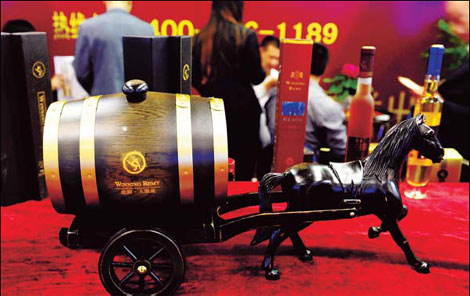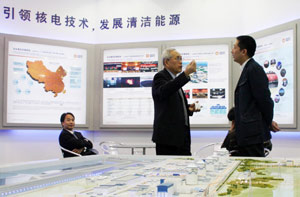Made for China ...
Updated: 2011-10-24 09:07
By Ding Qingfen (China Daily)
|
|||||||||||
|
Imported beverages at an international food exhibition in Zhengzhou, Henan province. China's drive to increase imports could provide a boost for the crisis-ridden global economy. [Photo/ China Daily] |
Foreign firms are eyeing the Chinese market as they try to beat the downturn
GUANGZHOU - While Europe struggles with its sovereign debt crisis and recovery falters in the United States, China is becoming the focus of attention for global manufacturers hoping to increase sales in the world's second-largest economy.
While the global recession has made buyers reluctant to place long-term orders at the 110th Canton Fair in Guangzhou, exporters said that the country's huge consumer market and its rapid economic growth have inspired confidence in the future of global business.
Attending the country's largest trade event for the first time, Ronny Laux was excited. "I met the Chinese Premier when I participated in the Canton Fair," said the Asia sales director for Masa (Tianjin) Building Material Machinery Co Ltd.
On the opening day of the fair on Oct 14, Premier Wen Jiabao visited the International Pavilion, which was established to promote Chinese imports.Wen stopped at the Masa booth during his walkabout and talked with the German businessman.
As the world's largest manufacturer of building-materials machinery, Masa sees China as a strategically important market and, although it is based in Germany, the company also has a subsidiary in Tianjin.
"The business is still small here, but we hope 25 percent of our global orders will come from China in the future because the market is so huge," he said.
As the global debt crisis prompts a slowdown in export growth, China is focusing on increasing imports and boosting domestic consumption to shore up its economic growth.
In September, China's exports grew by 17.1 percent year-on-year, the lowest rate of growth since February, while imports increased by 20.9 percent.
During his keynote speech at the opening ceremony of the trade fair, Wen said: "China will expand imports and stabilize exports to maintain balanced foreign trade."
On Tuesday, the National Bureau of Statistics said that China's economy expanded by 9.1 percent in the third quarter from a year earlier, and by 9.4 percent during the first three quarters.
"China is one of the places that US retailers are looking to for growth," said David G. French, senior vice-president of government relations at the US National Retail Federation (NRF).
As an executive of a body that represents more than 2,500 US retailers, French spent his first visit to China attending the Canton Fair to assess the business opportunities for member companies.
Together with some NRF colleagues, French met officials from Chinese retailing associations. "They have confirmed our conception of what is going on in China, the opportunities and the challenges," he said.
The US garment retailer Gap Inc, an NRF member, announced last week that it will expand its network in China and increase the number of its stores to 45 next year from the current 15.
"That trend is set to continue (among retailers)," said French.
The European Union is attempting to resolve its sovereign debt crisis, while in the US the high unemployment rate and a collapsed housing market are weighing on demand.
For global companies and exporters, China - whose growth is expected to be six times that of the US and the euro area, according to estimates from the International Monetary Fund - will be a key market as they attempt to weather the global financial downturn.
To promote imports, the organizers of the fair set up the International Pavilion a few years ago. The display area of the pavilion for the October event was 20,000 square meters, the largest ever, and 529 companies from 49 nations and regions, including the US, Spain, Japan and South Korea, applied to attend the fair and display their goods.
The organizers plan to hold a series of seminars and forums during the fair to help the companies make contact with global purchasers and Chinese buyers, said Liu Jianjun, deputy director-general of the China Foreign Trade Center at the Ministry of Commerce, who is also a spokesman for the fair.
According to Customs data, China's imports increased by 26.7 percent year-on-year to $1.29 trillion between January and September.
During the first nine months of the year, imports from Vietnam surged by 52.5 percent, while those from the United Kingdom rose 29.3 percent. Imports from Germany also rose by 29.1 percent, and Canada by 51.8 percent. Imports from Russia increased by 52.5 percent and South Africa 139.4 percent.
Last month, Zhong Shan, vice-minister of commerce, said that in the next five years, the country will try to import more from emerging nations and economies with a large trade deficit with China in a bid to balance trade.
Meanwhile, the nation will also prioritize imports of a range of products, including advanced technical equipment, key parts, commodities and raw materials and consumer goods, he said.
China not only possesses a huge consumer market, it also has high demand for commodities and energy-related goods, thanks to its rapid economic growth and limited resources.
In 2010, imports of soybeans accounted for 92 percent of national domestic consumption, while cotton was 26 percent and crude oil 54 percent. Iron ore at 6 percent and bauxite at 50 percent underlined the important role imports are playing in the country.
As the largest global energy consumer, China has "huge potential as a market", said Juan M. Martin Baranda, manager of international business development at Repsol YPF, the largest Spanish oil company.
"Not only do we want to sell more goods to China, but we also expect to expand here by producing locally," he said.











